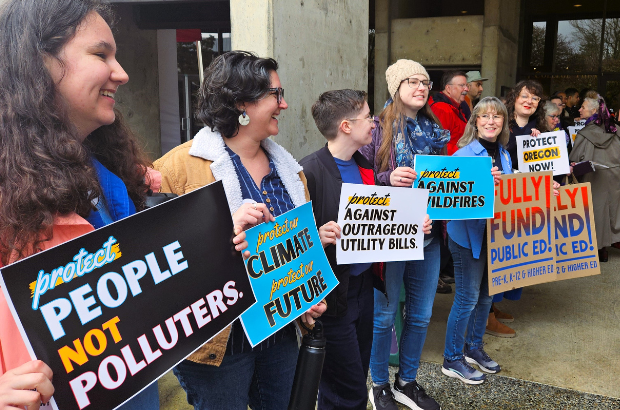
Heating and powering our homes and businesses generates a lot of our climate-changing pollution; our built environment is a major contributor to global warming. If our homes and buildings were carbon-free and energy efficient, we would significantly reduce our climate pollution, drastically cut energy costs for owners and renters, and improve air quality where we live and work.
For example, in both Oregon and Washington State, climate-worsening pollution from buildings are growing at a faster rate than any other source, with this increase largely attributable to the use of fossil gas in homes and buildings. Burning fossil gas in homes and buildings is not only a significant contributor to climate change, but also poses significant health risks for our communities, children, and other vulnerable populations.
Indoor air quality issues are particularly concentrated for low-income residents in smaller units with poor ventilation. Communities of color are already disproportionately impacted by outdoor air pollution, and should not continue to be disproportionately harmed by poor indoor air quality as well. Gas appliances also worsen our outdoor air quality. For example, California’s residential appliances releasing more than two times as many NOx emissions as all of their gas power plants combined, and commercial gas appliances releasing just as much NOx pollution as all of California’s cars.
States and many cities in the region and around the country are increasingly looking at ensuring all new buildings are electric as a key cost-effective pathway for achieving their local or state greenhouse emissions goals. Electrifying buildings is critical to addressing climate change, but it is also achievable, affordable, safe, and creates a more resilient energy system.
We are working with lawmakers and community partners to move rapidly toward electrifying our buildings for heating, cooling and cooking. We can also construct homes and buildings that get all their energy from sustainable sources, and even produce as much energy as they use — net zero energy buildings.

Seattle shows how local governments can play a big role in cutting pollution
Local governments can play a powerful role in responding to the climate crisis. Here's how Seattle is improving its standards for emissions from buildings, curbing pollution and providing a model for community involvement in charting a path to clean air.

Fighting for lower costs and less pollution in NW Natural’s latest rate case
Something is up, and unfortunately, it may be a higher utility bill for Oregon gas customers. In a time when communities are already bracing for Congressional Republicans’ new energy tax hike, NW Natural Gas Company is trying to raise costs on Oregonians as well. Even worse, they aim to raise our gas bills to boost their shareholders’ profits and invest in expensive fuels under the guise of decarbonization, rather than providing lower-income customers with the option to install an energy-efficient heat pump! Climate Solutions does not intervene in every rate case, but when we think there is…

Oregon’s 2025 Legislative Session: Climate Wins, Losses, and the Road Ahead
Oregon’s 2025 legislative session delivered mixed results for climate progress. Sound familiar? That’s because this is the second year in a row that Oregon lawmakers fell short of delivering the bold investments and climate action this moment demands. While we secured hard-fought wins and defended against serious threats that would unwind existing progress, this was far from a banner year for climate action in Oregon. Still, this session laid important groundwork, and we have a clear call to action for the road ahead.

Our communities deserve a climate future, tell lawmakers to act now
Oregon’s legislative session is almost over, and lawmakers have only passed one of nine critical bills in the Energy Affordability and Resilience Package. The rest are still sitting on the table, and we need your help to move them forward.

Remember when NWN was secretly piping hydrogen gas into Portland homes? Well, no more secrets.
Oregon lawmakers have taken action to improve public oversight of gas utilities’ hydrogen “pipe dreams.”

Tell Oregon lawmakers: We need a strong Climate Justice Budget in 2025!
Federal climate rollbacks threaten our progress — and Oregon families can’t wait for clean energy, affordable heating and cooling, and climate resilience. Lawmakers are finalizing the state budget for the next two years. Now is the time to speak up for a strong Climate Justice Budget that protects communities, lowers energy bills, and creates clean energy jobs across the state

Stop utility companies from charging YOU for their lobbyists and lawyers
The Oregon State Senate will hold a floor vote on SB 88 - Get the Junk Out Rates to protect your families and your budget by holding large utility companies accountable. Can you email your legislators urging them to support this crucial legislation?

Midpoint Momentum: A Climate Progress Update from Oregon's 2025 Legislative Session
We’re officially over halfway through Oregon’s 2025 legislative session. Here’s the inside scoop on dynamics at the Capitol, the status of key clean energy and climate priorities, and how you can help keep the momentum going.

Join the Building Resilience Lobby Day! Speak Up for Climate & Community Justice
Join Climate Solutions and our partners for the Building Resilience Lobby Day at the State Capitol on Wednesday, May 7. Together, we’ll talk to legislators in Salem and push for bold action on climate, energy-efficient housing, and energy justice.

A major win for WA families and affordability
Initiative 2066 is unconstitutional! So what does this mean for WA?
